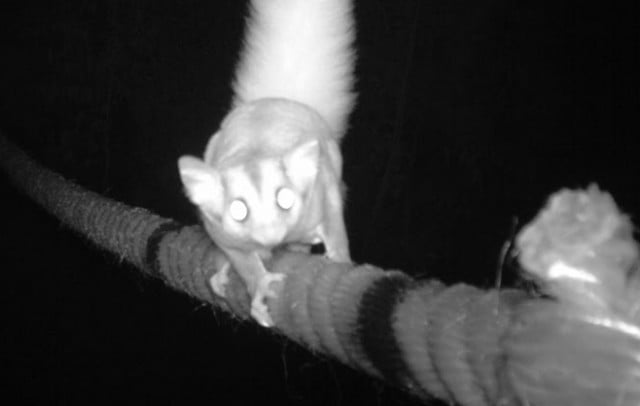
Landscape change, through the clearing and fragmenting of habitats, is a leading cause of biodiversity loss for our native animals.
Yet the disruption to populations, in terms of time and distance, has been mostly unknown until now.
Researchers have found disruption can occur at three kilometres and within about 30 years of habitat separation (isolation).
‘The results are startling’, lead researcher and Southern Cross University (SCU) mammal ecologist Dr Ross Goldingay said.
The research team, involving SCU, Monash University and the Queensland Parks and Wildlife Service, has published its findings, ‘Fine-scale genetic response to landscape change in a gliding mammal’, in the open access peer-reviewed scientific journal PLOS ONE.
Dr Goldingay said the team used sophisticated genetic techniques to examine how the squirrel glider, a small gliding marsupial, had responded to living in habitat patches in two highly fragmented landscapes in Queensland.
‘One of the great strengths of our study is that it involved two landscapes; one around Brisbane and one around Mackay in North Queensland,’ he said.
‘When you get similar results for two areas that are 750km apart you have confidence you are seeing a general response.’
The molecular ecologist on the team was Monash University’s Dr Andrea Taylor.
‘Our sample locations showed high levels of genetic structure, meaning that gene flow had been severely disrupted,’ Dr Taylor said.
‘What we did not expect was that this disruption can occur over distances as little as three kilometres and within about 30 years of habitat separation (isolation).’
The cause: the loss of tree cover between habitat patches.
The squirrel glider relies on tree cover to move around. Behavioural studies show that once canopy gaps exceed 50 metres, the ability of this species to move between habitats was impaired.
Squirrel gliders are found from the South Australian/Victorian border through south-eastern Australia to northern Queensland.
The study showed that gliders in isolated habitat patches were losing genetic variation and measures of inbreeding were increasing.
Dr Goldingay said the prognosis was grim.
‘So what does this mean for the squirrel glider?’ he asked.
‘Theory predicts these genetic changes are likely to be precursors to population collapse. The value of this research is that having identified the potential for future loss, we can do something about it before that loss occurs.
‘Obviously tree planting should occur but this won’t work where major roads exist,’ Dr Goldingay said.
‘We and other researchers have been conducting field studies of artificial structures such as tall wooden poles for gliding and rope-bridges for climbing to see whether they can be used to reconnect habitat patches over roads.
‘Surprisingly, squirrel gliders readily take to these structures and use them frequently.
‘I would also add that this genetic result will not be restricted to squirrel gliders.
‘A small number of overseas studies have identified similar results in reptiles, birds and mammals, and particularly where urbanisation has occurred.
‘I predict many species will be affected in the same way. So where we want to retain biodiversity we need to look at how we can reconnect patches of habitat.’



